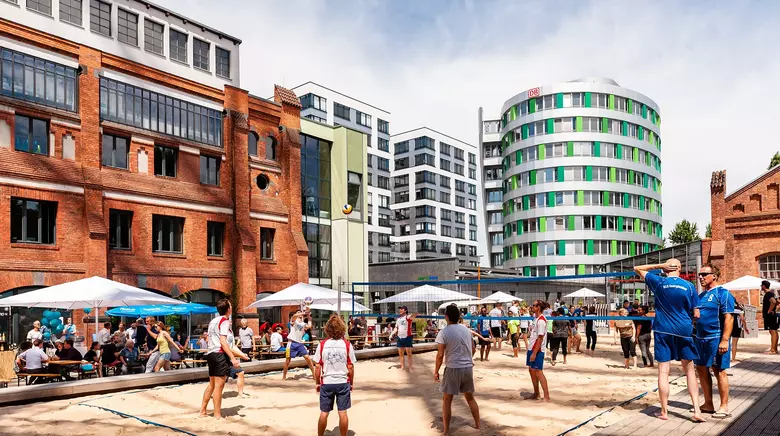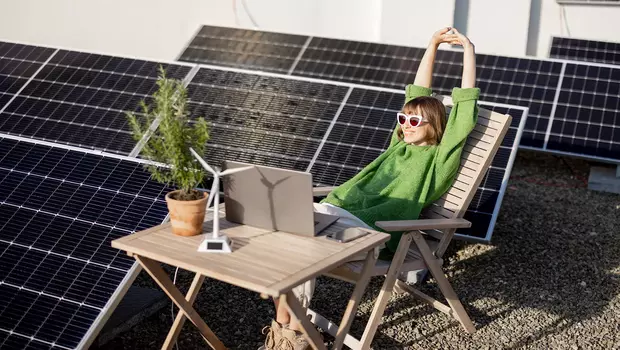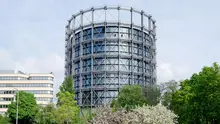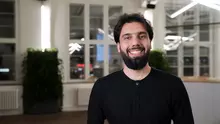A career with a future at the EUREF Campus Berlin – an interview with chairperson Karin Teichmann

Berlin is one of Europe’s leading centres of innovation. The German capital offers not just a unique network between business, science and government but is also the home of several “future hubs” – sites where pioneering technologies and innovations are being developed in close collaboration between companies and institutions of research and education. One of these important future hubs is the EUREF Campus in the Schöneberg district of Berlin – the real-life laboratory for the shift to renewable energy.
Karin Teichmann, member and spokesperson of the board of EUREF AG, has made a significant contribution to shaping the EUREF Campus as a centre of innovation. With many years of experience, including at Berlin Partner where she was responsible for attracting new enterprises to the city, she moved to the EUREF Campus around eight years ago and since then she has dedicated herself to the development of this visionary project. But what exactly does the EUREF Campus do? How is it shaping the energy and mobility transformation? What careers are possible on the Campus? And why is Berlin the perfect location for future-oriented careers?
In our exclusive interview, Karin Teichmann offers compelling insights into the role of the EUREF Campus, the contribution made by future hubs to Berlin’s economy and science and the outstanding career opportunities available to talented people here. Be inspired by her expertise!
What exactly is the EUREF Campus?
We’re a campus where people work, research, teach and learn about topics to do with the energy and mobility transformation. There are currently 7,000 jobs here. Big companies like Deutsche Bahn and Schneider Electric are based here, as well as medium-sized ones like Stiebel Eltron, Wilo and Würth Elektronik. In addition we have many research institutes and young, world-class startups. This mix is what makes EUREF what it is. And we do all this as a private future hub that has always been run without any subsidies at all. So we’re not one of the state-owned industrial centres.
But the EUREF Campus isn’t just a workplace for the people here. It’s also a place for people to network and get to know each other.
There are six restaurants – one even has a former Michelin-starred chef – plus a bakery on our site. Our pool, beach volleyball court and our many after-work events are particularly popular. We encourage people to get together. Quite simply, it’s a beautiful place here.
And what exactly is a future hub?
A place where business and science develop and research future-oriented technologies and innovations. Networking business and science is pretty much our bread and butter. Future hubs are places where you meet people, come up with new ideas together and then develop them. Our focus is the energy transformation, while the Berlin-Buch future hub, for example, concentrates on medicine and the healthcare industry as well as life sciences and biotechnology. As you can see, some future hubs have specialist topic areas. In Berlin there’s a total of eleven future hubs.
Why is Berlin, and in particular the EUREF Campus, the ideal location for future-oriented careers?
Berlin is a cosmopolitan city and an attractive one for international talents. It offers closeness to the government and associated organisations. The city has outstanding infrastructure to offer. We’re a centre of innovation.
The EUREF concept of innovation workshops makes the campus interesting. It’s a place where you can meet market participants from along the whole value chain. Every year 100,000 professional visitors find their way to the campus. Rapid cooperations and good networking are possible here. That’s attractive for talented people. Where else could you meet so many different people who are all interested in similar topics, in one place?
Here we learn from each other and take advantage of the close links between science and business.
In your opinion, what kind of role do the future hubs play in science and business in Berlin?
A big one. The students, professionals and researchers really do work closely together here. A closer connection between practice and theory would hardly be possible. The companies at EUREF get involved at an early stage in the selection process for student applicants, they award bursaries and sign contracts for student interns. Early on, young talents come into very intensive contact with companies here. It’s very exciting for the students to be able to work in close contact with practice. This is exactly the kind of co-innovation that a future hub enables. It wouldn’t be possible in this form anywhere else. Everyone works together here – from Fridays for Future to the Fraunhofer Institut.
What courses are there at the EUREF Campus, and what are the entry requirements for them?
TU-Campus EUREF offers four advanced study programmes : MBA BUILDING SUSTAINABILITY, MBA ENERGY MANAGEMENT, MBL EUROPEAN AND INTERNATIONAL ENERGY LAW and MBA SUSTAINABLE MOBILITY MANAGEMENT.
Every year 120 students are enrolled – 30 per course. To secure one of the sought-after places, you need at least a bachelor’s degree plus two to three years of professional experience. Many students already have one master’s. You can find more details on our website.
What career opportunities are there for talented people on the EUREF Campus?
Jobs in the fields of energy and mobility transformation. On the one hand there are engineer-driven job profiles; on the other there are many job profiles in digitisation. For example, Arcadis Deutschland is currently looking for a civil engineer, while CONVEX ENERGY is seeking software developers. But employers also have vacancies in traditional service professions, because the energy transition creates a high demand for explanation. Schneider Electric, for example, is seeking Senior Sustainable Consultants.
Whether you work with your hands or on a computer – you’ll find jobs at EUREF if you’re at the start of your career, looking for a second job or are an experienced professional.
Where can talented people find these jobs?
There are two options. Either look at the EUREF companies on our website and then search their careers pages for job offers. Or use one of the major jobs portals, like the Talent Berlin one, entering “EUREF” as a keyword. You’ll then be shown the available jobs.
What career tips do you have for talented people interested in a career on the EUREF Campus?
We like to have people actually “on campus”. So only apply if you really do want to work on the site here. In the pandemic we noticed that more ideas emerge when people meet each other live.
And be ready to look beyond your own silo. If you’re enthusiastic about trying new things out, this is the place for you. Bring your ideas into the mix and stay open to dialogue! If you want to shape a more sustainable and climate-friendly world, you have an opportunity to do that here.
Also: subscribe to our newsletter! Every Monday it brings you news about events currently happening on the campus. The events are a great opportunity to get a taste of the campus atmosphere and make some initial contacts. Upcoming events can also be found on our website.
What’s your assessment of how the Berlin future hubs are developing? Where are the potentials and challenges?
Future hubs are exciting because they’re real-life laboratories. Quite simply, the idea of getting business and science to work together is the future. The hubs offer space and time to try out and push ahead with new technologies. Did you know, for example, that autonomous driving was developed at EUREF? We have private streets here and don’t need permission to use public roads. Which means we were able to start testing early. And in general, Berliners like to try out new things.
At the future hubs we can show what Berlin’s capable of. These places are predestined for innovations.
But the city needs to take care not to lose its attractiveness. At the moment there’s a decrease in both tourism and immigration numbers. That’s mostly down to the difficult housing market. But it’s also because there’s a lack of fresh concepts. So Berlin has room to become even more imaginative and brave in implementing ideas. We need private capital and investors. So let’s keep the innovations coming!
Thank you, Karin Teichmann.








